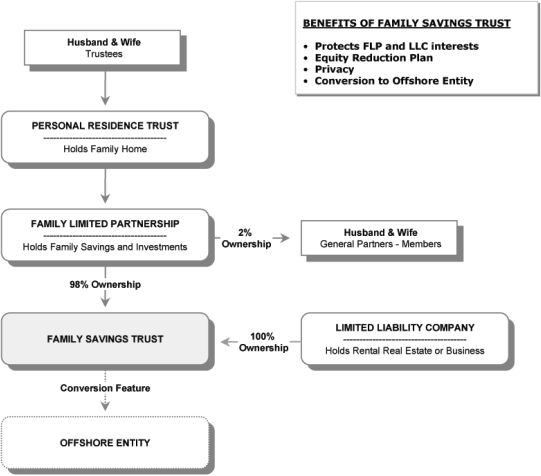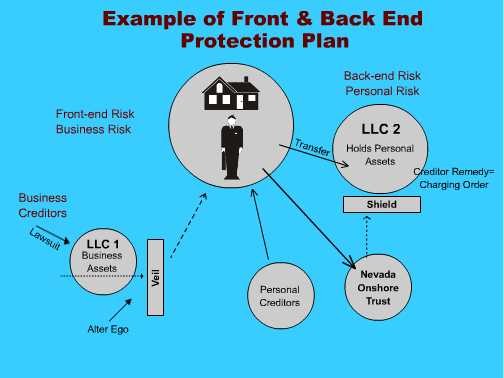How to Protect a Trust s Assets For Dummies
Post on: 30 Апрель, 2015 No Comment

Among the myriad of duties you assume as trustee is a duty to protect the trust assets. In todays financial world, protecting the assets most likely doesnt mean hanging on to those assets with which the trust was funded unless those assets consist of shares of a closely held business, a family-owned farm, or the like that the grantor specifically instructed be retained in the trust.
You will look to diversify the assets to allow for modest gains while preventing losses. You may choose to enlist the help of investment advisors, trust companies banks, and brokerages. Additionally, attorneys, accountants, and enrolled agents can be of aid in the process of managing the assets of a trust.
In that case, you fulfill your duty as trustee by retaining the asset and seeing that its managed as competently as possible. However, barring an instruction in the document to retain specific assets, as trustee you must constantly look at the assets to determine whether theyre the most appropriate to serve the trust purposes.
Diversifying the trusts assets
“Dont put all your eggs in one basket” doesnt just apply on the farm. One of the cornerstones of todays investment philosophy is to diversify assets into different classes, such as stocks and bonds, and into different industries, such as transportation, healthcare, consumer goods, energy stocks, and so on. By spreading the risk among several classes of investments and several industries, the danger of overall loss lessens.
The theory is that not all investments respond in the same way to all market conditions, so youre better prepared for market changes in one class or asset or one industry if you invested in several. Diversified mutual funds or mutual funds families can be one answer to diversifying assets in a smaller trust.
Unlike investing your own money, where youre allowed to invest in anything thats legal, investing as a trustee requires that you exercise due diligence in researching investments and assume only moderate risk. Speculating, although not specifically prohibited, is strongly discouraged. Your goal shouldnt be to scale great heights but rather to allow modest gains and prevent drastic losses.
Failing to adequately diversify the assets held inside the trust (except those assets which the grantor specifically requires that you retain) can leave you open to accusations of incompetence (or worse) from the trust beneficiaries or remaindermen. If you choose an investment policy that runs counter to the standard wisdom, document your reasoning and be prepared to defend your choices in court, if necessary.
Asking for help in managing a trusts assets
Getting recommendations by word of mouth, from other professionals, and even from advertisements is great, but be sure to check them out thoroughly, including a call to the Better Business Bureau to see whether any complaints have been filed against them.
If managing the trusts assets proves to be a task that you are not comfortable handling on your own, the following types of professionals can provide assistance:
Investment advisors: An investment advisor is a person or company who advises the trustee as to what investments to make given the purpose of the trust, its size, and the needs of the beneficiaries. If you choose to use an investment advisor, always use one that charges a fee for services, not one who receives a percentage of sales!
Trust companies, banks, and brokerages: Trust companies and banks that have trust departments can be useful for holding the assets of the trust. They can prepare periodic statements, annual accounts, and income tax returns and also invest the assets (all for a fee, of course). Trust assets may also be placed in a brokerage account or accounts, which provide you with periodic statements and investment advice. Generally, the fees involved in this option are for trades. Some brokerages prepare annual accounts and tax returns for an additional fee; others dont. If you need this service, ask before you open the account.

Lawyers, accountants, and enrolled agents: Lawyers who specialize in trust law can be useful to you in interpreting the trust instrument and guiding with state laws. Depending on individual state laws, law firms may also have trust departments, where the assets of the trust can be invested and the trust can be administered. Accountants and enrolled agents who are familiar with trust administration can prepare accountings and income tax returns.
Every estate and trust requires different levels and sorts of advice. Some additional professional you may want to consult include the following:
Business consultants: If an asset of the trust or estate is an operating business, dont be shy about finding someone to help you run it.
Charitable advisors: If youre trustee of a charitable foundation, reputable advisors can assist you in developing the foundations charitable direction and show you how to identify charitable organizations you may want the foundation to contribute to.
Doctors and other medical professionals: As a trustee, youre often charged with providing resources to guard the health and general well-being of trust beneficiaries. Sometimes, you need to do more than just foot the bill you actually have to make arrangements with various medical professionals for necessary services.
Litigators: Even though you, as fiduciary, presumably already have an attorney, you may find you need representation in a lawsuit involving the state or trust. Remember, the trust or estates attorney isnt always experiences in litigation and in courtroom situations, and you will probably refer you to a competent litigator in your area if you find yourself in this situation He or she wont be offended if you go elsewhere for representation, and in fact, should applaud the move.
- Add a Comment Print Share














